Benelli (motorcycles)
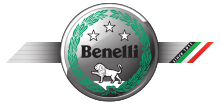 | |
| Subsidiary | |
| Industry | Motorcycle |
| Founded | 1911 |
| Founder |
Giuseppe Benelli Giovanni Benelli Francesco Benelli Filippo Benelli Domenico Benelli Antonio "Tonino" Benelli |
| Headquarters | Pesaro, Italy |
Area served | Worldwide |
| Parent | Qianjiang Group |
| Website | www.benelli.com |
Established in 1911, Benelli is one of the oldest Italian motorcycle manufacturers.[1] It once manufactured shotguns, although this part of the business is now a separate company.
History
Early years

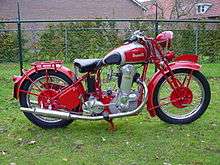
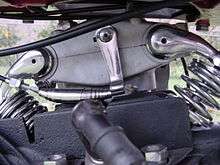
Benelli was established in Pesaro, Italy in 1911, which possibly makes it the oldest of all European motorcycle factories in operation. (Moto Guzzi—the oldest European motorcycle factory in non-stop operation—was established in 1921.) After losing her husband, the widow Teresa Benelli invested all of the family capital into the business in the hope that it would offer stable work for her six sons: Giuseppe, Giovanni, Francesco, Filippo, Domenico and Antonio ("Tonino"). She also sent Giuseppe and Giovanni to study Engineering in Switzerland. Initially the business had 6 employees in addition to the 5 brothers working (Tonino didn't work because he was too young.)
In the beginning, it was just the Benelli Garage, which repaired bicycles and motorcycles, but was already able to produce all of the spare parts needed for repairs.[2] During World War I, Benelli worked hard fixing parts for the Italian machines in war and in 1919 the first motorcycle was presented to the public. In 1920 the company built its first complete engine in-house, a single-cylinder two-stroke 75 cc model, immediately adapted to a bicycle frame. A year later in 1921, Benelli built its first motorcycle, using their own engine which had by then become a 98 cc model.
Two years after that, using a version specially designed for competitions, Tonino "the terrible" took to the track. He displayed an extraordinary natural talent as a rider and embarked on a very successful career which confirmed the company's exceptional capacity for development and production. Riding a Benelli 175, Tonino Benelli won four Italian championship titles in five years: in 1927, 1928 and 1930 with the single overhead camshaft (SOHC) version, and in 1931 with the double overhead camshaft (DOHC) version. Unfortunately, a bad crash during a race in 1932 cut short his brilliant career and on 27 September 1937 Tonino died following a "silly" road accident.
As World War II loomed, the Benelli company debuted their four-cylinder supercharged 250cc racing bike. This was intended to compete in the 1940 season, building on Benelli's success in the 1939 Isle of Man TT Lightweight 250 cc race. With the start of the war, the Benelli Four was limited to competition in a handful of Italian domestic races.
Beyond World War II
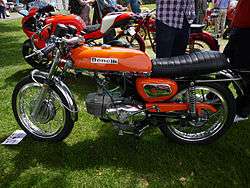
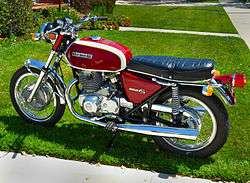
Wartime destruction caused Benelli to remain out of production until 1949. Unsold war motorcycles to be used by the Italian army were adapted to become civil motorcycles and generate income to restart operations. When production resumed, designs were still largely based on those of the pre-war period. In 1949, Giuseppe Benelli left the family concern to found the Motobi marque.
By 1951 Benelli was offering a range consisting of 98cc and 125cc lightweights (the Leoncino or lion cub) and 350cc and 500cc singles. The Leoncino was available in both two-stroke and four-stroke forms. The need for cheap transport in post-war Italy meant that these lightweight models became immensely successful . Similar models were offered by Moto Guzzi, Ducati and Laverda, and the same economic conditions led to the growth in popularity of Vespa and Lambretta scooters. Benelli also sold motorcycles to American retailer Montgomery Ward, who rebranded them as Riverside and marketed them through their catalog.
In 1962, when Motobi was not in good financial conditions, it was acquired by Benelli, and the combined company produced around 300 motorcycles a day and had 550 employees. Motobi designs continued in production under the Benelli name.
In 1969, Benelli introduced the Benelli Tornado 650, a vertical twin designed primarily for sale in Great Britain and the US. The Tornado earned a reputation for reliability and high performance, despite its somewhat hefty weight at 480 pounds (220 kg). Benelli claimed at the time of launch that the Tornado was capable of 57 hp at 7,400rpm for a top speed of 117 mph.[3] The Tornado (later the Tornado S) was discontinued after 1974, when Benelli introduced a series of "multis" intended to compete with Japanese triples and fours.
The de Tomaso years
Towards the end of the 1960s, the arrival of Japanese manufacturers caused a crisis in the European motorcycle industry. The original Benelli company was heavily involved in the American motorcycle market, selling motorcycles under 350cc through Montgomery Ward. The advent of competition from Japan led to Benelli products (still largely of single cylinder pushrod design) losing popularity as they were perceived as old-fashioned in comparison to Hondas of the era which sported overhead cam engines with electric starters, in much the same way as the British motorcycle manufacturers such as Norton, BSA and Triumph were affected in the larger capacity sector.
In 1973 Benelli was acquired by Argentinian industrialist Alejandro de Tomaso together with its competitor Moto Guzzi which led to the development of new models featuring multi-cylinder engines, such as the "350 Quattro" and the "500 Quattro", and of the incredible 750 Sei powered by a huge six-cylinder in-line engine, which put the firm briefly ahead of the Japanese competition. Although technically advanced, Benelli motorcycles of the 1980s were plagued by problems, and the production was finally stopped in 1988 when the company was merged into Moto Guzzi to create "Guzzi Benelli Moto S.p.A.", and the production plants in Pesaro were sold.
Benelli motorcycles from the 1970s and 1980s, particularly the Sei, often command higher prices than their contemporaries on the secondhand market.[4]
Rebirth
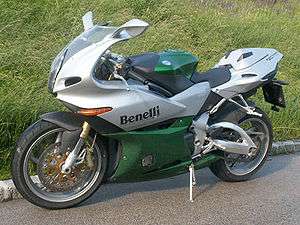

After an unsuccessful attempt at revival in 1989 backed by Pesaro-based manufacturer Giancarlo Selci, in 1995 Andrea Merloni took charge.
The Tornado Tre 900 super sport bike was launched in 2002, and the TNT, roadster some years later.
Benelli is now part of motor Group Qianjiang, a corporation in Wenling, southeast China. Benelli Q.J. is located in Pesaro, with the same workforce in the same premises as previous proprietor Benelli S.p.A.
Benelli S.p.A. recently forayed into the motorcycle market of India through a joint venture with DSK Group of India based in Pune where DSK holds 51% and benelli S.P.A holds 49% and sold more than 200 high end bikes within the first 4 months of launch. Benelli has launched five models in India, in a wide range of engine displacement and price. Includes Benelli TNT 300 with 300cc twin cylinder engine, TNT 600i and 600GT with 600cc four-cylinder motor, TNT 899 with 898cc three-cylinder mill and the flagship TNT R with 1131cc three-cylinder power plant.[5] DSK-Benelli sold over 3000 units in India over 18 months from the start of sales, one third of them being the Inline-four cylinder engine Inline-four engine 600i, making them one of the fastest premium motorcycle selling brands in India. [6]
Benelli also entered the closely guarded Iranian market in 2016 showcasing their bikes at Iran's IRIB conference center in the capital Tehran.[7]
Racing
Tonino Benelli was the undisputed protagonist of the early racing successes. With an extraordinary natural talent for riding, he began a rewarding career that confirmed his exceptional technical skill and innovation within the company. In the saddle of a Benelli 175, Tonino won the title of Italian Champion in 1927, 1928 and 1930 riding the SOHC version, and in 1931 with the DOHC version. The numerous victories in the European World Championship were a prelude to one of the most sought after successes of all motorcycle producers: the Isle of Man Tourist Trophy, at that time the most important race in the world.
European championships
| Year | Champion | Motorcycle |
|---|---|---|
| 1932 | |
Benelli 175 bialbero |
| Year | Champion | Motorcycle |
| 1934 | |
Benelli 175 bialbero |
In 1939, Ted Mellors was victorious, racing in the saddle of the Benelli 250. In 1950, Dario Ambrosini also won the 1950 Isle of Man TT, repeating Mellors’ success and consecrating his title by winning both the Italian and the World Championships.
MotoGP World Championship
| Year | Champion | Motorcycle |
|---|---|---|
| 1950 | |
Benelli 250 |
| Year | Champion | Motorcycle |
| 1969 | |
Benelli 250 |
MotoGP World Constructors champions
- 250 cc class; :
- 1950, 1969
In the 1960s two extraordinary riders competed in the races: Tarquinio Provini, who won the Italian Championship with the 250 in 1965 and Renzo Pasolini who won the Championship with the 250 as well as the 350 in 1968 and 1969. In 1969, the enormous effort invested in competition was rewarded with the 250 world title thanks to Kel Carruthers, who also again won the Tourist Trophy in the same year. It would also mark the last world championship for a four-stroke motorcycle until the advent of the modern MotoGP era in 2003. Many of the most famous riders in the history of motorcycling raced with Benelli bikes, from Mike Hailwood to Jarno Saarinen. Former Australian Superbike champion Peter Goddard signed with Benelli in 2001.[8]
Tourist Trophy
| Year | Champion | Class | Motorcycle |
|---|---|---|---|
| 1939 Isle of Man TT | |
Class 250 cc | |
| 1950 Isle of Man TT | |
Class 250 cc | |
| 1969 Isle of Man TT | |
Class 250 cc | |
See also
References
- ↑ Announcement of Benelli's purchase by Qianjiang Group
- ↑ "Benelli Motorcycles". Retrieved 2007-05-30.
- ↑ James Adam Bolton (November–December 2009). "1973 Benelli 650S Tornado". Motorcycle Classics. Retrieved 2009-10-08.
- ↑ Bike EXIF. "Benelli Sei". Retrieved 2012-05-10.
- ↑ http://www.indiancarsbikes.in/motorcycles/dsk-benelli-pune-sales-record-126649/
- ↑ http://auto.ndtv.com/news/dsk-benelli-on-a-roll-after-selling-3-000-units-in-india-1253876
- ↑ Asre Khodro. "Benelli in Iran".
- ↑ Peter Goddard. "Career Background". Retrieved 2008-01-23.
External links
| Wikimedia Commons has media related to Benelli motorcycles. |